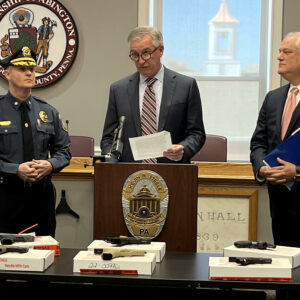While the debate over adding new gun laws continues, a local prosecutor says Pennsylvania’s current laws can have a major impact on gun crimes, and he believes his record proves it.
Montgomery County District Attorney Kevin R. Steele and his department have been cracking down on straw purchases of guns, charging some two dozen people with so-called straw purchasing and related offenses.
All of the defendants are from Philadelphia.
The Bureau of Alcohol, Tobacco, Firearms and Explosives defines a straw purchase as buying a gun for someone prohibited by law from possessing one or for someone who does not want their name associated with the transaction.
In June, the district attorney’s office announced the arrests of Antwoin Lofton, 25, and Aja Morris, 27, who were part of an organization involved in straw purchasing of firearms. Kenneth Lyles, 30, has been named in the case. Morris and Lofton turned themselves in. Lyles remains at large.
“Gun trafficking and straw purchasing of firearms put guns in the hands of criminals, arming people who are not legally allowed to possess a firearm,” Steele said in a statement. “This is dangerous and a threat to public safety. We are committed to continue going after and tracking down anyone buying and selling firearms illegally in Montgomery County.”
According to his spokesperson, Montgomery County law enforcement has investigated illegal gun purchases involving more than 750 firearms since 2019.
Unlike other prosecutors in Pennsylvania, including Philadelphia District Attorney Larry Krasner, who routinely promote more gun control, Steele prefers the law on the books.
“I think we could use more tools,” Steel said, adding he believes Pennsylvania’s current gun laws are particularly effective when local authorities team up with federal agencies. “Lost and stolen mandatory reporting could be helpful in some cases. My point is [the current statutes do] not hinder investigations in these cases…using those existing laws, strategies, and new technologies successfully.”
Tough sentences for those convicted of gun crimes are important, too, Steel added. He pointed to efforts to break up gun trafficking groups and the five-year mandatory minimum prison sentence for multiple straw purchases as proof that a strong message is being sent to criminals.
“If you look at the cases, not just the arrests, we’re getting significant sentencing in these cases,” he added. “In Montgomery County, we have not found a system that makes it difficult to punish these cases. Our courts take these cases very seriously, and you see that reflected in the sentencing.”
Since the beginning of the year, 22 people have been arrested and charged with straw purchasing. That includes a case in February when eight people were arrested in connection with a gun trafficking organization that purchased 94 firearms and tried to purchase 23 more, all to be illegally resold. All the defendants were from Philadelphia and faced dozens of felony charges related to straw purchases of firearms, illegally transferring firearms, operating a corrupt organization, and other charges.
Steele recently wrapped up his tenure as president of the Pennsylvania District Attorneys Association and remains a member of the executive committee. PDAA says its mission is to make sure the public and its members understand criminal justice matters.
The PDAA has long complained that straw purchases are to blame for the gun violence in Pennsylvania. It is also one of the few issues that tend to unite gun advocates and gun control groups.
“Generally, Pennsylvania gun laws are quite lax,” said CeaseFirePA’s executive director, Adam Garber. “The main protection we have is a strong background check system. But beyond that, you can walk in and buy a gun in a very short period with minimal safeguards and no training needed.”
CeaseFirePA’s deputy director of government affairs, Brandon Flood, elaborated, saying that Brady (Brady United.org) gave Pennsylvania a B-minus in its ratings of gun laws across the United States. That is far from a failing grade, and Flood added the commonwealth can do much more.
“There is definitely room for improvement,” he said. “Just to illustrate, recently, the state legislature took up the issue of liquor privatization, a proposal that was defeated. We need to apply that same level of energy to tighten our gun laws. One thing Pennsylvania gets right is the need for a background check. Anyone who goes into a federally licensed firearm store or even looks to purchase a firearm or a rifle at a gun show is subjected to an extensive criminal background check.”
Steele said having such additional laws would be useful, but not having them need not hinder gun trafficking investigations.
One commonsense strategy used by the Montgomery County Detective Bureau is to routinely review multiple gun purchases by individuals.
“Typically, an investigation begins when a person who is not legally allowed to own a gun is arrested/found to be in possession of a firearm, said Kate Delano, a Montgomery County District Attorney’s Office spokesperson. “That firearm is traced to the purchaser, and the investigation begins.”
According to Delano, tracking those cases is very time-consuming as many gun shops still use a paper/carbon-copy system to record firearms purchases, which are mailed through the U.S. Postal Service to the Pennsylvania State Police, who then hand-key the information into a database. Given the volume of purchases, it takes a while to record serial numbers related to gun purchases.
“The Attorney General’s Office has been making a concerted effort for the last several years to get more gun stores onto the Electronic Record of Sale (EROS) system, which instantly sends the record of the firearms purchase to the state police database, which is traceable by police officers who recover a gun at a scene,” Delano said. “There is continued outreach, and progress has been made, but there is a long way to go.
For example, a routine review of gun purchases by the Montgomery County Detective Bureau led to the investigation and arrest of Daniel Lucas in 2020. Lucas, also from Philadelphia, allegedly straw-purchased 36 firearms in 77 days in eight counties. He pleaded guilty and was sentenced by Montgomery County Judge Wendy Rothstein to ten to twenty years in prison.
Another technological tool for law enforcement is the NIBN (National Integrated Ballistic Information Network) machine that tracks firearms by the signatures left on the fired cartridge cases like a fingerprint. All four suburban Philadelphia counties share the technology. When a bullet is fired, each gun leaves its own signature on the casings. The NIBN system compares these individual casings against its six million FCC database and creates a list of high-probability matches.
Steele said a growing number of gun trafficking organizations have been dismantled, and the mandatory minimum sentencing required by the Brad Fox Law for straw purchasing sends a strong message to the defendants and others who might be thinking of straw purchasing that it’s not worth it.
Please follow DVJournal on social media: Twitter@DVJournal or Facebook.com/DelawareValleyJournal


